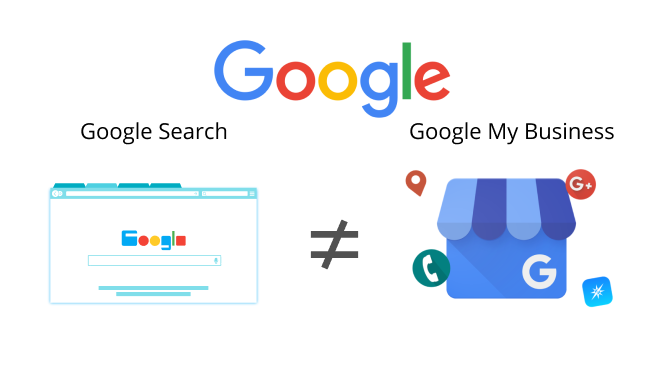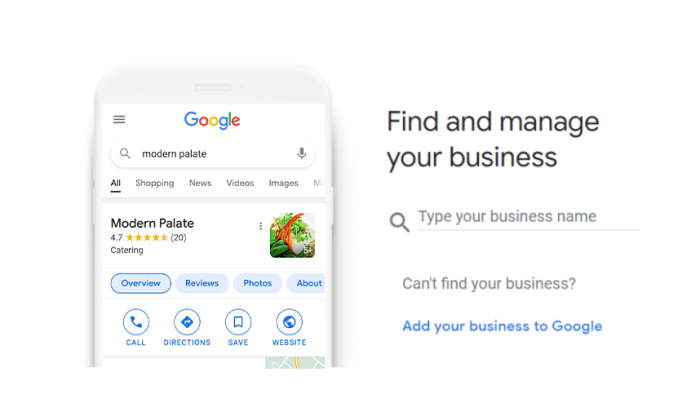A positive reputation is a valuable asset. You deserve to be in control of what the internet says about you or your brand. We specialize in building, monitoring, and protecting digital reputations. Schedule time with our team to audit your existing digital presence and find ways to elevate and enhance your online impression.
Google My Business
How To Succeed (Locally!) On The
World’s Search Engine?
We all know the formula, and it sounds so simple: If you want your business to succeed, it must rank highly on Google Search. But for some, this goal can prove to be easier said than done, if not entirely unattainable.
How do you get your company to stand out among, well, every other business in your field?
How can a business circumvent the limitations of Google Search? Is that even possible?
Can you somehow use Google to reach your customers directly?
Yes, all these things are, indeed, possible.
STEP 1
Step one is understanding the difference between Google Search and Google My Business.

Google Search rankings are challenging because they cannot be recklessly manipulated. Google is incredibly skilled at ranking websites via a complicated algorithmic process that aggregates hyperlinks, popularity, current trends, and other such factors. And it’s also very good at detecting when someone is trying to manipulate its rankings.
Google can no longer be forced, tricked, or managed, as was possible in the early days of the internet—for example when websites would hide keywords at the bottom of a page in the same color font as the background (so that they were visible to searches but not to the site’s human visitors). Achieving, and then maintaining, a high ranking on Google Search requires an ongoing, organic process of matching your site’s overall profile to what Google’s algorithm prefers. And the “ongoing” aspect is important because Google is constantly refining its criteria, your business must always be flexible and responsive to those changes. Google Search’s continual modifications make the tool very good at what it does, but they can also make being seen very difficult for small and/or locally focused companies.
STEP 2
What about step two? Incorporating Google My Business (GMB) into your company’s business strategy.
Using GMB, businesses such as retail shops and restaurants, for example, can appeal directly to customers in their local area who are, in turn, more likely to solicit them—without having to compete for attention against every other boutique retailer or restaurant in their state, let alone the country or the whole world.
What (Really) is Google My Business?
The first thing to know is that a Business Profile on Google is not the same as a GMB account. After recognizing information signals of an active organization, Google may automatically create your business profile. Conversely, a GMB account is established and controlled by you, the business owner. This is why creating a GMB account is so important: you have power over how your company is perceived on Google, and, therefore, in Google Search. A Business Profile on Google is often created and “filled in” via automated processes, which means that much of the information about your company in that profile could be incorrect or outdated. This could also include posted questions (and answers!) directly on the listing about your business without your permission or knowledge that they even exist.
A GMB account is much like any Google account, except that it is specifically tied to your business. It is not a personal account you simply extend to your company. When you create your GMB account, you provide the basic facts about your business, so Google displays the information you want when someone does a search. This includes the following:

 Your business’s name
Your business’s name  Your company’s physical address, website URL, hours of operation, and direct contact information
Your company’s physical address, website URL, hours of operation, and direct contact information  Product links and information, which can include links to menus, pricing, and service descriptions
Product links and information, which can include links to menus, pricing, and service descriptions  Google Maps locations, with the option of including addresses for multiple locations
Google Maps locations, with the option of including addresses for multiple locations  Photos and videos related to your business
Photos and videos related to your business Cultivating a well-optimized GMB account requires getting many important details right. Ideally, your business description will be well-written and accurate, follow certain rules of content, and contain relevant keywords. You must be careful about the category you select for your business because this can significantly influence Google Search results. This is separate from your business’s “attributes,” which can be self-determined (e.g., “wi-fi available,” “wheelchair accessible”) or the result of customer-submitted data and feedback (e.g., “popular with locals”).
Why You Need a GMB Account
Why go to all this trouble?
Simple: Half of the Google Searches are local, meaning that users are looking for products and services that are available in their immediate area. When someone searches “Italian restaurant” or “auto body shop near me,” for example, they want to find something very specific that they can easily access. And by creating a direct line between your business and the potential customers searching for the kind of goods or services you offer, a GMB profile offers the advantage of higher conversion rates.
Furthermore, because of the required verification process for GMB-listed businesses, these companies are generally more trusted, with respect to both their self-provided information and their reviews by others, which also contributes to more customer conversions, thereby boosting the bottom line of any locally focused business.

However, using GMB to improve your visibility and success comes with a few caveats.
For example, GMB is structured for companies that serve customers in person and so assumes your business has a physical address, if not a full brick-and-mortar presence. Although, for example, multiple businesses can occupy the same location and therefore have the same address, in such instances, things can get complicated. The same can be said for companies with wide service areas or other specific issues. How high your business appears on Google’s Search Engine Results Pages (known more commonly as SERPs) depends on the user’s proximity to your company.

Never include false or deceptive information in your GMB profile…
and avoid breaking the prescribed rules around your GMB account. If you do, Google can penalize or suspend your account, thereby hindering, if not outright preventing, your business from appearing high in search results—which could cause you to miss out on potential customers.
For example, avoid listing multiple businesses at the same location that are not legally distinct entities or that are associated with the same phone number and contact information. Furthermore, Google is sensitive to the reviews that it suspects are spam and might delete them if identical reviews appear in more than one place. So, ensuring that they are organic and unique is best. Composing your profile correctly is important to avoid getting on Google’s bad side.
Optimizing Your GMB Account
The easiest way to optimize your GMB account and stand out among other local businesses on Google Search is by engaging a partner such as Blue Ocean Global Technology for their expert assistance. Google has provided a wealth of options and tools for companies in GMB, and because so many choices are available, consulting with a professional is a great way to quickly and accurately pinpoint the ones that are best for your business and situation, and that will ensure that GMB works for you to its fullest.
Consider these additional benefits to optimizing your GMB account:

GMB can synthesize the data from your account into Knowledge Panels (the panels on the right-hand side of SERPs that appear when a user’s inputs are sufficiently specific), which can individualize your business’s identity to potential customers.

Data garnered through Google Insights can help you improve engagement with a customer base already eager to work with you.

An optimized GMB account can prevent a local business from having to compete for customer attention with similar businesses that are located much farther away than the user would want.

Messaging through your GMB account allows customers to directly engage with you or a designated employee through texts. This can create almost instant engagement with customers.

The public can leave questions on your profile, giving you the opportunity to address their specific concerns directly in a way that will also be beneficial to future customers. You can also pose questions there yourself as another way of engaging with your customer base through your GMB account.

Posts in your GMB account can alert customers to upcoming events and can extend your brand awareness while keeping your content fresh and your rankings high in search results. Think of posts as an extension of your business description.

Adding photos of or related to your business (e.g., of completed projects, menu items, happy customers) lets you to control the image branding for your company, rather than allowing Google’s web crawlers or the general public do so. What’s more, Google reports that when companies include pictures in their profile, they “receive 42% more requests for directions on Google Maps, and 35% more clicks through to their websites than businesses that don’t.”

Reviews can increase a customer’s likelihood of patronizing your business, so don’t be afraid of asking for them! Companies that actively engage with their customers for reviews are often rated higher than those that don’t, which means greater visibility and a better bottom line.
Don’t overlook the precious opportunity to invest in your digital presence and optimize how your company is searched on Google. GMB, like many of the tools Google offers businesses and the public, involves a high level of automation. Approaching it honestly and using it as intended will allow your business to engage more effectively with customers, especially at the local level.
The system might take a little while to recognize your business, but anything worth doing is worth doing right—and when your company starts appearing at the top of the list in one search after another, you’ll know you’ve done it right!








